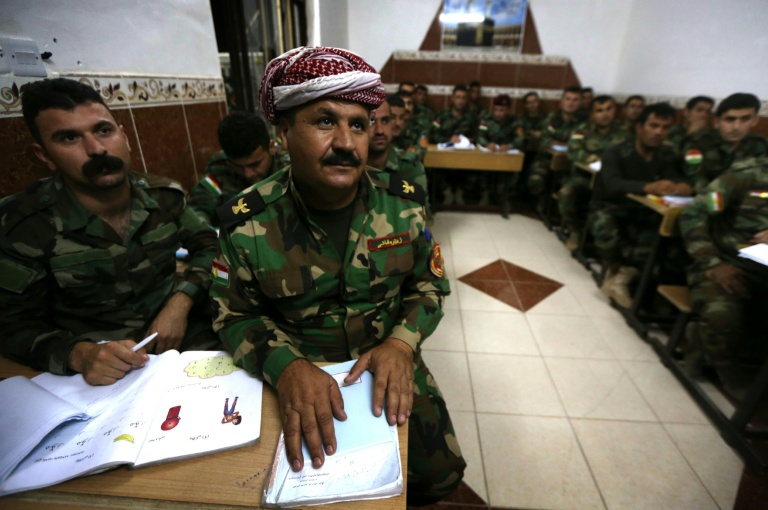
Educating Mustafa: Kurdish fighters learn near the front
The 21-year-old is one of dozens of members of the autonomous Kurdish region's peshmerga forces studying at a school in the northern Iraqi village of Bahra, some three kilometres (two miles) from the closest Islamic State (IS) group position.
A sign on a house in the village reads "Peshmerga School", and inside, camouflage-clad fighters crowd narrow wooden desks in a room with a whiteboard at the front.
"We weren't able to go to school" in the turmoil of the 1990s, a decade that included an uprising against now-executed dictator Saddam Hussein and inter-Kurdish fighting, said Mustafa.
He worked as a farmer, and "after 2003 and the fall of the former Iraqi regime... I joined the ranks of the peshmerga. I wasn't able to go to school, and remained illiterate."
According to the Kurdish regional education ministry, 15 percent of the population is illiterate, down from a high of 32 percent in the 1990s.
The problem in the peshmerga is not limited to Mustafa, who said fighters have been captured by IS because they could not read signs.
- 'Couldn't read the signs' -
"Many of our colleagues fell into enemy hands by mistake because they were illiterate and didn't know where they were or couldn't read the signs telling them they had reached dangerous areas," he said.
Thousands of federal security personnel fled their posts after IS launched a sweeping offensive in northern Iraq, clearing the way for Iraq's Kurdish region to gain or solidify control over northern territory claimed by both it and Baghdad.
The peshmerga have since battled IS from the western border with Syria to Iran in the east, losing ground to a renewed northern offensive by the jihadists last August, but later driving them back with support from US-led air strikes.
Before, "when we went anywhere, we had to ask others to show us the place where we wanted to go," said Badreddin Biro Aziz, another 21-year-old peshmerga fighter studying at the school.
"We saw ourselves as weak," said Aziz, who like Mustafa was a farmer before joining the peshmerga. "Now I can read my name and the name of my father and other things."
In one class, more than 20 peshmerga follow what their teacher writes on the whiteboard, with some going up to read aloud or write on the board themselves.
The school at Bahra is the first set up near the front line with IS since the conflict began, but it follows an old pattern: there was a Kurdish school in the mountainous Nawbardan area when they were fighting Iraqi government forces in 1968.
The current school was the idea of Lieutenant Colonel Bindyan Hajji Jamil.
- Classes held in shifts -
"We opened this school at the border with the enemy to say to them that we care about both the military and educational sides," and more than 80 peshmerga are studying there, Jamil said.
The fighters leave their weapons with others at their positions when they leave for classes, which are held in shifts between 9:00 and 11:00 pm.
"We chose nighttime (for the classes) because there are few duties," peshmerga Major General Sayyid Hazar Tahir said.
"We teach them the basic principles of reading and writing in the Kurdish language, which we consider necessary at checkpoints and on military duty, and mathematics because we need this for reading maps," said Jamil.
Knowledge of numbers is also needed to operate some of the weaponry provided to the peshmerga by the US-led coalition against IS, he said.
The current classes will continue for three months, after which it will be decided whether to continue or not based on conditions in the field, which "are not easy" at forward positions, said Jamil.
In the classroom, Mustafa stands up at his seat and reads aloud from the whiteboard, before sitting down again as his classmates applaud.
The lessons bring benefits outside the military realm: "Now I can send a text message on my mobile phone to my colleagues," Mustafa said.
"I wasn't able to do that before."

Legal Disclaimer:
MENAFN provides the
information “as is” without warranty of any kind. We do not accept
any responsibility or liability for the accuracy, content, images,
videos, licenses, completeness, legality, or reliability of the information
contained in this article. If you have any complaints or copyright
issues related to this article, kindly contact the provider above.

















Comments
No comment